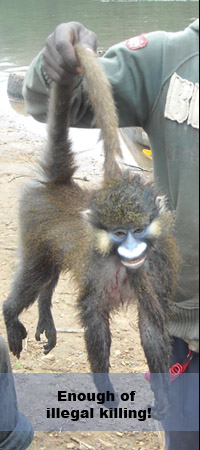|
Local biodiversity is declining at an alarming rate. Many plants and animals, once abundant, are now expatriate (local extinction) or so rare that it is unlikely for us and our children to see them during our life time. The loss of local biodiversity has profound impact on health, agriculture, beauty, air purification and many other nature services.
Local biodiversity conservation included conserving the flora, fauna and habitats - collectively referred to as biodiversity - of a defined area, usually along local authority boundary lines. For us, local biodiversity conservation and restoration are vital strategies because they have tremendous positive impacts on nature and can be replicated easily. For example, in Congo, we succeeded in protecting wild gorillas and stopping illegal hunting and trade of animals at the local level. The same field strategy is replicated in other local areas where gorillas are still found.
Forests of Southeast Asia
Endangered Species International (ESI) focuses on protecting and restoring local biodiversity, endangered species, and their habitats including primary rainforests and marine ecosystems (e.g., mangroves, sea beds, coral reefs). We work in many fronts including land conservation and restoration, rewilding, awareness, pushing ban on pesticides, fighting illegal trade of animals and plants, and creating wild coral gardens.
The forests of Southeast Asia have suffered the greatest biodiversity loss of any tropical region over the last fifty years due to population growth, agricultural use, palm oil plantations, timber production, and other human activities. ESI has key local projects in Southeast Asia which directly save rainforests, coral reefs, sea grasses, and more than 135 threatened species. All our long-term activities empower indigenous people and local communities to become everyday conservationists in the field.
Forests of Africa
The rainforests of Africa are also in grave danger due to mining, deforestation, and other human activities. Forests of Ivory Coast are mostly gone and the monkeys that once were abundant, and almost invisible. Several species have become critically endangered. One may now be extinct. Two-thirds of Africa's remaining forests are located in the Democratic Republic of Congo (DRC). In Congo, where vast forest remains, ESI works very hard to protect forest elephants (forest elephants are smaller than savanna elephants), gorillas, chimpanzees and more than 47 threatened animals. According to scientists, poachers slaughtered 65% of the world’s forest elephants in just 12 years. Our presence and hard work can save all forest elephants in our project areas. Indeed, in 2014 no forest elephants were illegal hunted and gorillas are no longer killed for bush meat.
Coral reefs in the Coral Triangle
Twenty percent of coral reefs have already been lost and 35% are seriously threatened by direct human actions such as over-fishing, water pollution and sedimentation. Coral reefs supply about 10% of the marine fisheries landings and are a critical area for breeding, spawning and the early life stages and feeding of many marine species. Further, they are the main tourist attraction (therefore main source of local income) in many regions of the world. We have field projects that directly protect and restore coral reef ecosystems including creating and supporting local marine protected areas and conducting wild coral gardening.
It is simple: We work to secure a future for endangered species worldwide, and your contributions make our local work possible and enable us to be 100% independent with outstanding work for nature. Your contributions are a strong voice for nature. With a donation today to ESI's work, you will help stem the tide of death for many animals and the loss of wilderness. We know the work is hard and complex but it is more important than ever to fight hard to save biodiversity.
For the wild, for nature,
Thank you!
ESI team, indigenous people, local communities, and children around the world

Links
|









